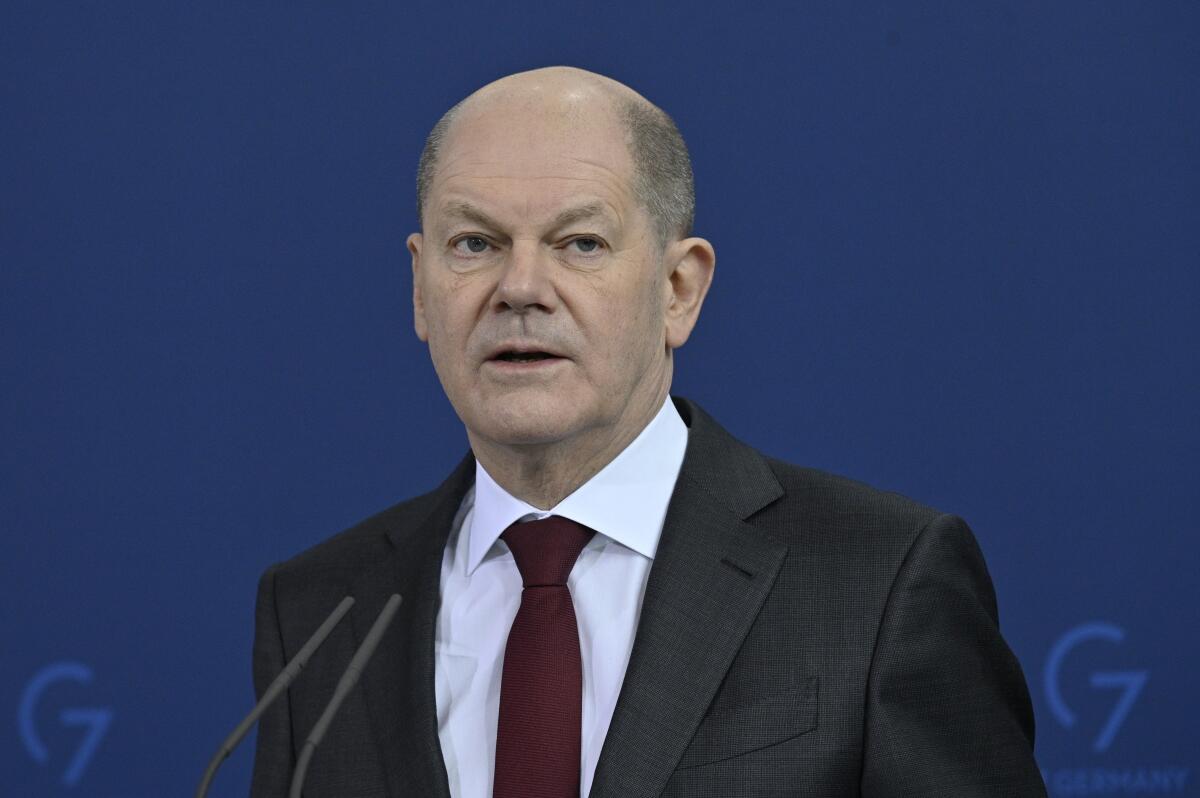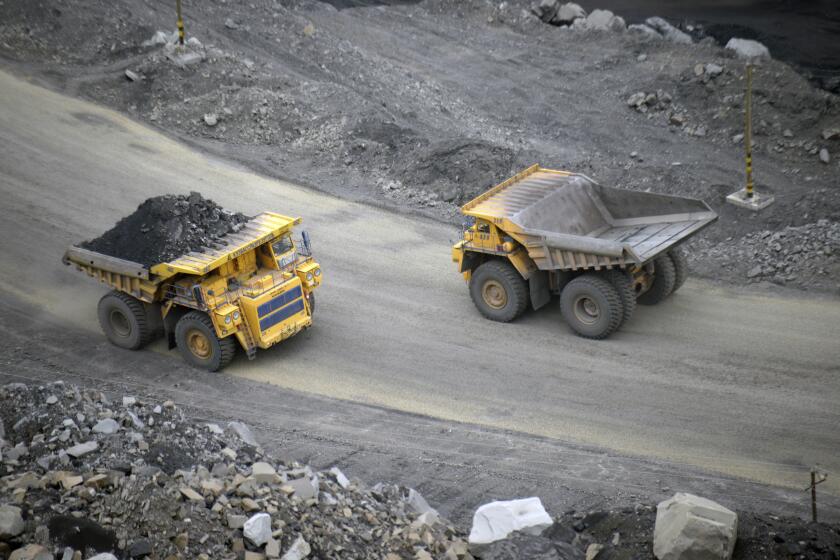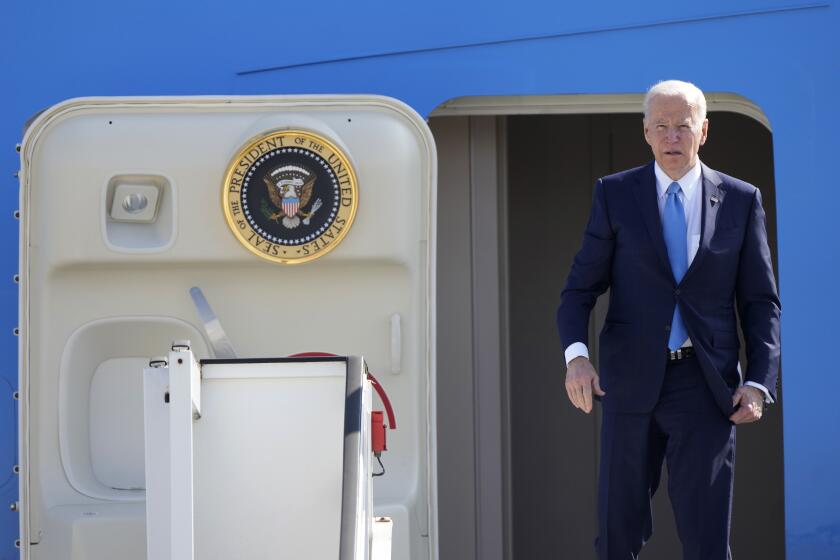Germany gets fresh criticism over its purchase of Russian natural gas

- Share via
BERLIN — Germany is again under fire from its Western European and U.S. allies for hesitating to cut business ties with Russia.
Chancellor Olaf Scholz and his government maintained Germany will continue to buy billions of dollars’ worth of natural gas and oil from Russia each week for the foreseeable future to keep German car companies and factories operating at full throttle, even though critics in Ukraine and the West argue that the $220 million Germany sends to Moscow every day for Russian energy is being used, at least indirectly, to finance its war against Ukraine.
“We are pursuing a strategy that will make us independent of Russian gas, coal and oil, but just not right away,” Robert Habeck, Germany’s economy and energy minister, said Sunday evening in an interview on German television. Two hours later, the leader of Scholz’s Social Democratic Party amplified the sentiment.
“An immediate embargo of Russian natural gas would be the wrong way to go,” Lars Klingbeil told another German TV talk show.
Germany relies on Russian energy for half of its energy needs.
In addition to criticism from the United States and Ukraine, others this week, including Poland, lashed out at Germany for not assuming its share of the economic burden.
In an interview published in Germany’s Welt Sunday newspaper, Jaroslaw Kaczynski, head of Poland’s ruling Law and Justice party, demanded that Germany stop buying oil and natural gas from Russia.
The proposed ban on coal imports would be the first EU sanctions to target Russia’s lucrative energy industry over Moscow’s war against Ukraine.
“You can’t constantly support a great power like Russia with billions in payments from the purchase of energy,” said Kaczynski. “This is inadmissible from a political and moral point of view. This must come to an end, and Germany should finally take a clear stance on this.”
The steadfast refusal to ban Russian oil and natural gas imports has become particularly awkward for Germany — Europe’s economic powerhouse — following allegations by Ukraine of genocide in Bucha, after Russian forces retreated from that city. Because of the shame of the Holocaust and its Nazi past, Germany’s action — or inaction — when it concerns moral leadership in a time of crisis comes under special scrutiny across Europe.
Germany, which has a yearning for peaceful resolutions to conflicts in part as a reaction to its war-filled 20th century past, faced widespread criticism before the war started for initially refusing to send any defensive weapons to Ukraine as a Russian invasion loomed, and because it also blocked the transfer of German-made weapons from other NATO members to Ukraine. Germany also faced criticism because it initially opposed cutting Russian banks off from the SWIFT global banking network.
Lithuania announced Sunday that it has banned Russian energy imports while Poland and Slovakia, among others, have called for speedy action. The German government’s business-like explanations that it cannot possibly stop importing Russian energy until later this year — because an embargo would risk sending its economy into recession — have resonated across Europe. The United States said in early March it had stopped all Russian oil and energy imports in response to Russia’s invasion of Ukraine.
While Scholz’s government says it cannot afford an immediate cutoff of Russian oil and natural gas, others within Germany differ.
“We’ve got to stop financing Putin’s war,” said Marieluise Beck, directing her comments at leaders of her Greens party and the ruling Social Democrats, shortly after returning from a trip to Kyiv. “Ukraine doesn’t have much time left. We’ve got to take another look at how much [economic pain] we can handle ourselves.”
Others in the ranks of the Greens party have also called for an immediate embargo.
The renewed foot-dragging on tougher sanctions against Russia by Germany threatens to further embarrass the country that had long been deepening business ties with Russia, even after its 2014 annexation of Crimea.
An earlier German government in which Scholz’s Social Democrats served approved a business deal with Russia in 2015 — just a year after the Crimea takeover — to double the amount of Russian gas imported through a new Nord Stream 2 pipeline that was completed last year. The pipeline was designed, critics say, to circumvent Ukraine and rob it of billions of dollars in annual transit fees.
Rescue efforts continued Monday outside Kyiv as Biden and European leaders called for swift action against Russia for civilian deaths.
“For the whole world and especially Germany, the message has to be clear — don’t give Russia another cent because it’s blood money that’s being used to butcher people,” said Kyiv’s Mayor Vitali Klitschko in an interview with Germany’s Bild newspaper on Monday. “We need an immediate embargo on all oil and natural gas from Russia.”
Ukraine’s ambassador to Germany, Andriy Melnyk, said the alleged massacres uncovered in Bucha only reinforced the need for Germany to take on a leadership role in standing up to Russia rather than focus on German-Russian business ties and its own economy.
“I hope this massacre will serve as a red line for the German government so that it finally starts to act,” Melnyk said. “That means an immediate embargo on oil, natural gas, coal and metals. I don’t understand how anyone in Germany can sleep at night after seeing horrors like this without doing anything about it. What’s it going to take for Germany to act with tougher sanctions? A chemical weapons attack? What are they waiting for?”
Scholz had bristled at a suggestion last week during a German TV interview by leading independent economists that an immediate embargo on Russian gas would only slow, but not cripple, the German economy. “They’ve got that all wrong,” Scholz said sharply. “It’s irresponsible to calculate some kind of mathematic model like that.”
The German chancellor, noting large numbers of jobs were at stake, added: “If we were to suddenly stop importing natural gas [from Russia], that would mean entire industrial sectors would have to shut down.”
Instead of banning Russian gas, German government leaders are mulling plans to conserve energy, such as introducing maximum speed limits on its high-speed freeways, prolonging the use of its last three nuclear power plants that were scheduled to be mothballed this year, and increasing its use of coal-burning power plants.
German President Frank-Walter Steinmeier has been a frequent target of sharp criticism from Ukraine and its ambassador for being a champion of business ties with Russia as a way to secure peace in Europe. Steinmeier, a former foreign minister, acknowledged Monday that he had been wrong about Russia.
“We were clinging to the idea of building bridges to Russia that our partners warned us about,” Steinmeier said, in particular apologizing for his support for the Nord Stream 2 pipeline that the United States and most of Europe warned Germany against because it increased German dependence on Russian natural gas. “We failed to build a common Europe. We failed to incorporate Russia in our security architecture…. I was wrong.”
Ukraine President Volodymyr Zelensky criticized former Chancellor Angela Merkel and former French President Nicolas Sarkozy in a speech on Sunday, inviting them to Bucha to see firsthand what happens after 14 years of concessions to Russia and leading opposition to Ukraine’s bid to join the North Atlantic Treaty Organization despite support for Kyiv’s bid by President George W. Bush.
“Former Chancellor Angela Merkel stands by her decision at the NATO summit in 2008 in Bucharest,” a spokesman for Merkel said, referring to her opposition to Ukraine’s bid.
Kirschbaum is a special correspondent.
More to Read
Sign up for Essential California
The most important California stories and recommendations in your inbox every morning.
You may occasionally receive promotional content from the Los Angeles Times.












